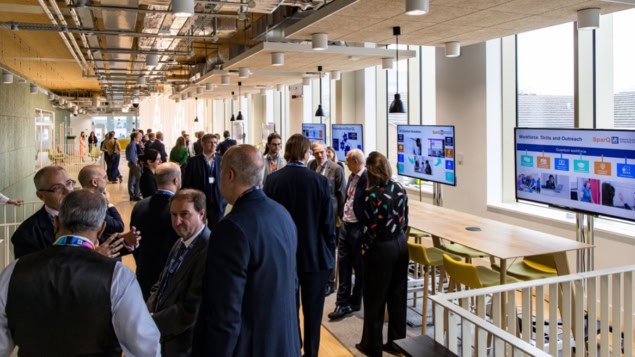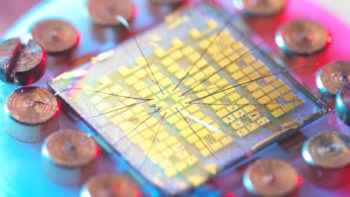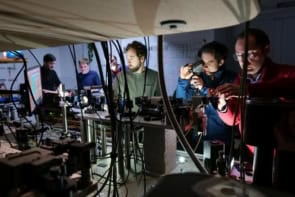The official opening of the National Quantum Computing Centre’s main facility highlighted the pivotal role it will play in fostering collaboration across the UK’s burgeoning quantum ecosystem

A building may be little more than bricks and mortar, but behind the façade it can bring people together and catalyse change. That was the vision for the main facility of the UK’s National Quantum Computing Centre (NQCC), located on the Harwell Campus in Oxfordshire, which is designed to foster collaboration and accelerate innovation across all parts of the UK’s quantum ecosystem.
At the official opening of the building, held at the end of October 2024, the NQCC team showed how that original vision had been turned into reality. In the new experimental labs on the ground floor, NQCC scientists who were previously working as individual teams in borrowed facilities around the Harwell site are now working in an environment where they can swap notes with colleagues working on other hardware platforms.
“It is always useful to have other scientists around to share ideas and solve specific problems,” said Klara Theophilo, an atomic physicist who is setting up trapped-ion systems based on chips originally developed at the University of Oxford and the National Physical Laboratory (NPL). “Trapped-ion systems share some of the same challenges as hardware platforms based on neutral atoms, while the cryogenic engineering we need is also being used for systems based on superconducting qubits.”
Theophilo and her scientific colleagues are benefiting from state-of-the-art experimental facilities purpose-designed for building and testing quantum computers. “This lab has the best environmental control I have ever worked in,” she said. “To achieve high gate fidelities we need careful control of both the temperature and the humidity to ensure that our lasers can manipulate the qubits with high precision, and in our previous lab space there was a constant need to realign and recalibrate the lasers.”
Joining the NQCC technical teams will be scientists and engineers from commercial companies who are building their own systems for quantum computing. In the coming months, several firms are due to install prototype hardware platforms commissioned by the NQCC as part of its programme to establish seven experimental testbeds based on different qubit modalities.
Others will be hosted at the Innovation Hub, the NQCC’s other facility on the Harwell Campus, while quantum networking company NuQuantum is also preparing to establish a team within the main building for a three-year co-development project with the NQCC. The aim of this programme, called Project IDRA, will be to build a distributed quantum computing system that will connect together multiple hardware nodes by entangling the qubits in different quantum processors.

facility like the NQCC can act like an anchor for businesses to build around, creating a cluster of companies that form a supply chain for each other
Mark Thomson, executive chair of the Science and Technology Facilities Council (STFC)
For the NQCC and its backers, the longer term hope is that bringing these hardware companies into the national lab will catalyse the formation of a quantum cluster in and around the Harwell Campus.
“We have a unique ability on this site to connect academia and national infrastructure with start-up businesses and large enterprise,” said Mark Thomson, currently the executive chair of the Science and Technology Facilities Council (STFC) and soon to be the new director general of CERN. “A facility like the NQCC can act like an anchor for businesses to build around, creating a cluster of companies that form a supply chain for each other. We have already seen that in the space sector, and I genuinely believe that we will now see the same clustering effect for quantum technologies.”
Indeed, many of the hardware providers who are installing their prototype systems within the NQCC are eager to find new ways to work with the national lab and its growing network of academic and commercial partners. “Establishing a presence in the NQCC is a great way for us to become more connected with the UK’s wider quantum ecosystem,” said Alice Voaden, project manager for Rigetti, one of the testbed providers. “It puts us in a better position to identify future opportunities for collaboration, which could help us to explore how emerging applications and software strategies can work with our technology.”
Beyond the technical work, the new facility brings together the NQCC’s growing team of technical and innovation specialists under the same roof for the first time. Previously distributed among temporary office spaces across the Harwell Campus, around 80 people working across a diverse range of activities now have the chance to make new connections and forge a collective identity that will help to establish the NQCC as a focal point for quantum computing in the UK and beyond.
Indeed, since the NQCC was established in 2020 it has put an increasing emphasis on building a community of hardware providers, software developers and end users who can work together to explore the value of quantum computing for the benefit of society and the economy.
“The early vision for the NQCC was to address the issue of scaling in quantum computing, and originally we were primarily focused on technology development,” commented NQCC director Michael Cuthbert. “But increasingly we’ve been turning our attention to scaling the user community for quantum computing, and today is an opportunity for us to highlight our activities across the breadth of our programme.”
Those efforts include providing easy access to quantum computing resources, offering learning opportunities to boost the ranks of scientists and engineers with an understanding of quantum computers, and working directly with organizations in the public and private sectors to develop use cases where quantum computing can make a meaningful impact.
In one example highlighted at the inauguration, applications engineers from the NQCC are working with software company Unisys and the University of Newcastle to explore how today’s quantum computers could be used to optimize the loading of cargo onto aircraft, which can cut fuel costs and reduce carbon emissions.
“What happens here will create jobs and businesses, and it will benefit people across the UK and beyond,” said Science Minister Lord Patrick Vallance, who officially opened the building. “You have created something that will bring academics and people from industry together to harness the power of quantum computing to solve problems that really matter.”

Another element of the NQCC’s remit is to provide clear, trusted and impartial guidance to government, businesses and the ublic. It is already working with NPL and other government and industry bodies on standards development, with the NQCC spearheading the global debate around responsible and ethical quantum computing. “Gaining public trust is vital to drive user adoption,” said Cuthbert. “The NQCC is in a unique position to provide thought leadership on ethical considerations, which will ultimately benefit the whole community.”
While the inauguration of the UK’s newest national lab was focused on the prospects for quantum computing, there were also reminders that the NQCC is a direct result of the country’s established strength in quantum science and technology. Following decades of basic research across many contributing disciplines, the National Quantum Technologies Programme, which has seen more than £1bn of investment since 2014, has been created a collaborative culture in which academics work in tandem with start-up companies to translate scientific insights into innovative technologies.
“We know that quantum computing will be a long-haul journey that requires some patience, but the NQCC is already showing what can be achieved through collaboration and co-location,” said Peter Knight, the architect of the NQTP and the instigator behind the NQCC. “Bringing companies and academics into the facility will enable dialogue, drive future collaboration, and accelerate progress towards our mission of delivering quantum computing at scale.”




